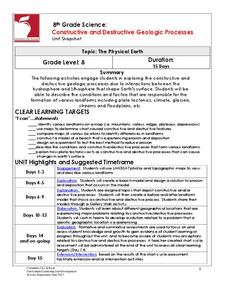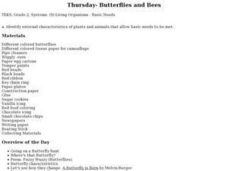NOAA
Ground-truthing Satellite Imagery with Drifting Buoy Data
Ground-truthing ... is it even a word? The last installment of a five-part series analyzes how scientists collect sea surface temperature data. Scholars use government websites to compare temperature data collected directly from buoys...
Curated OER
The Global Precipitation Measurement Mission (GPM) Lesson
Introduce your class to one of the ways that technology is benefiting humanity. The Global Precipitation Measurement Mission involves the data collected by nine satellites from different countries with a united focus on studying world...
NOAA
Biological Oceanographic Investigations – Through Robot Eyes
How can a robot measure the length of something when we don't know how far the camera is from the object? The lesson explains the concept of perspective and many others. Scholars apply this knowledge to judge the length of fish and the...
Virginia Department of Education
Mineral Identification
What's the difference between a rock and a mineral? And what properties are used to identify minerals? The first installment of a five-part series on earth materials and processes prompts young scientists to identify a set of...
Association of American Geographers
Project GeoSTART
Investigate the fascinating, yet terrifying phenomenon of hurricanes from the safety of your classroom using this earth science unit. Focusing on developing young scientists' spacial thinking skills, these lessons engage...
Teach Engineering
Inside the DNA
Get your class to take a closer look at DNA. Pupils conduct research to determine the methods used by scientists to analyze the molecular structure of DNA. The class members investigate different types of molecular imaging along with gel...
Columbus City Schools
Constructive and Destructive Geologic Processes
Show the class the world as they've never seen it before—from way above! Learners try to unravel the mysteries presented by rich satellite imagery, learn to interpret topographic maps, and study erosion by constructing their very...
Curated OER
Collisions and Momentum: Bouncing Balls
Students explore the concepts of potential and kinetic energy by bouncing assorted balls on different surfaces and calculating the momentum for each ball. They give examples of collisions and momentum in sports and understand that...
Curated OER
Making Sense of Density
Students identify the concepts of density, mass, and volume that define the property of a substance. They also determine that the properties of materials, such as, density and volume, can be compared and measured by using rulers,...
NOAA
Through Robot Eyes
How do robots assist ocean explorers in collecting data and images? The final installment in a five-part series has science scholars examine underwater images collected by robots and identify the organisms shown. Groups then calculate...
Space Awareness
Valleys Deep and Mountains High
Sometimes the best view is from the farthest distance. Satellite imaging makes it possible to create altitude maps from far above the earth. A three-part activity has your young scientists play the role of the satellite and then use...
Curated OER
Starring...Bears!
Students illustrate a First Nations' legend. In this legend of bears lesson, students read several legends which involve bears and groups of stars or constellations. After reading, students illustrate portions of the stories....
Curated OER
Save the Earth: It's Everyone's Home
Students explore how recycling helps save trees and protect the environment. For this environmental concern lesson, students color a handout of animals that live in forests. Students discuss how recycling paper can save trees and set up...
Curated OER
Biology: Butterfly Activities
Second graders examine various types of butterflies and insects around their school. They identify differences between beetles and butterflies. Students examine books about butterflies, complete symmetry drawings, and make ladybug key...
Curated OER
Companion Animals
In this animals instructional activity, students discuss their own pets. Then students answer 3 questions having to do with pets and overpopulation. Students then separate into debate teams and debate licensing and breeding issues.














